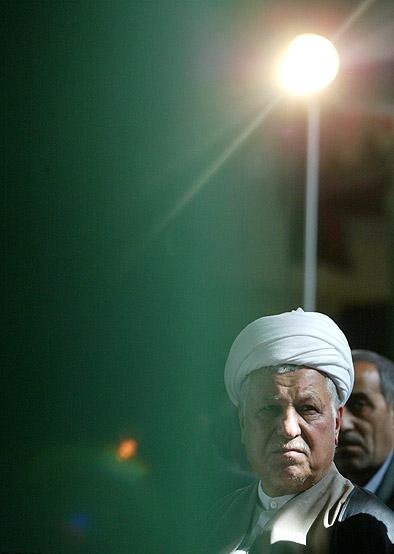I normally enjoy Juan Cole’s blog Informed Comment for his often brilliant insights into the Middle East. But today, he’s frothing in an over-the-top attack on the Iranian government for the Guardian Council’s rejection of Hashemi Rafsanjani (pictured above) as a potential presidential candidate in the June 14 election. His comments seem anything but informed:
![]()
Their exclusion is a further step toward authoritarianism and perhaps totalitarianism in Iran…
A major challenge for the remaining 8 presidential candidates will to get anyone to care about an election conducted on a vary narrow basis, which might well be fixed anyway.
OK, let’s deconstruct this.
Anyone with a passing familiarity with Hannah Arendt’s The Origins of Totalitarianism will realize that the current Iranian government falls pretty far from the two traditional examples of 20th century totalitarianism — Nazi Germany and the Stalinist Soviet Union. To throw around the term ‘totalitarianism’ this way only serves to disrespect the memory of those who suffered under the truly horrific Nazi and Stalinist regimes and to amplify the heated rhetoric over Iran.
No one disputes that the rejection of Rafsanjani’s candidacy is pretty far afield from what we’d expect from a free and fair democratic election. It’s obviously, as far as most observers can tell, a reaction from the Supreme Leader Ali Khamenei to reject a potential president who might challenge his primacy as the Supreme Leader. That’s an institutional fight that Khamenei has been waging for some time — it’s in many ways not so dissimilar to the ways that the American system spent its first decades settling.
There was no authority under the Articles of Confederation to chuck out the existing constitution for a new constitutional regime. There’s no constitutional authority for John Marshall to assert the power of the U.S. Supreme Court to conduct judicial review in Marbury v. Madison and subsequent cases in the early 19th century. There was certain insufficient constitutional authority to guide the lines between the federal and state governments, and that led fully to civil war. In a system like that of the Islamic Republic of Iran, where institutions are just barely 30 years old, it stands to reason that the relevant stakeholders will jockey to determine their places within the overall system.
Does that excuse Khamenei’s obvious power grab? No. But neither does it make Khamenei a totalitarian.
But as I noted a couple of days ago, it’s perfectly within the realm of possibility that Khamenei will ultimately ask the Guardian Council to reconsider Rafsanjani’s rejection, especially if Rafsanjani prevails upon Khamenei. Khamenei interjected in 2005 to allow two previously rejected reformist candidates to run in that election. So I’m not convinced this has entirely played out yet — most especially because I’ve not seen any comments yet from Rafsanjani himself, who remains an incredibly powerful politician and a critically important member of the founding generation of the Iranian revolution.
Moreover, as I noted in my overview of the eight remaining approved candidates, one of the remaining is the reformist Mohammad Reza Aref, a former vice president of Mohammed Khatami (a supporter of the ‘Green movement’ that supported Mir-Hossein Mousavi in the 2009 election and thereafter contested the results), and another is the moderate Hassan Rowhani, Iran’s former nuclear energy negotiation who’s incredibly close to Rafsanjani.
Would a totalitarian state approve those two candidacies? Of course not.
Whatever the illiberal and authoritarian tendencies of the Iranian regime from time to time, it’s not totalitarian. In a world where U.S. opinion about Iran remains very much a matter of life and death, and top U.S. and Israeli officials haven’t ruled out a military attack on Iran over its nuclear energy program, it’s simply irresponsible to throw that term around.
Cole adds this tidbit:
Some observers believe that Khamenei intends to abolish the presidency and go to a parliamentary system, with a prime minister.
I’ve not seen this in any media reports from Iran or otherwise, so I’d be curious to know Cole’s sources.
But in the Islamic Republic’s hierarchy, Khamenei has consistently waged fights — against the moderate Rafsanjani from 1989 to 1997, against the reformist Khatami from 1997 to 2005, and against the conservative Mahmoud Ahmadinejad since 2005 — to maintain the primacy of the Supreme Leader vis-a-vis the presidency.
In many ways, the president is already like a prime minister, because he’s the head of government, while the Supreme Leader is the head of state. That’s one of the reasons that the position of prime minister was discontinued after the 1980s — and many of the roles of the prime minister were subsequently assumed by the president.
I’m sure Cole knows all of this, which makes his troubling hyperbole all the more baffling.
